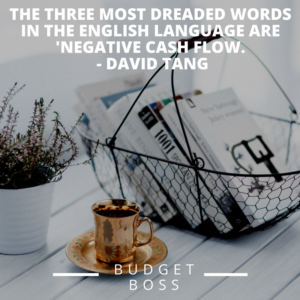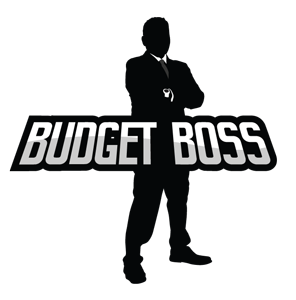Monday, November 26, 2017
What is Positive Cash Flow and Why is it Important?
When speaking about businesses, the term “Positive Cashflow” gets thrown around a lot. Most people recognize that for a business to survive and thrive there must be more money coming in than going out. What about the business of you? What about you and your monthly balance sheet? I believe that the reason our people find themselves in debt is that they are focused on things that don’t matter like consumerism, meaningless experiences, and people’s opinions, rather than ones that matter like debt, growth and positive cash flow. To achieve true financial freedom, you must have positive cash flow, so this week at Budget Boss will be aimed to show you the importance of it. Today, I will describe what it means to have a positive cash flow and why it matters so much. Remember that the foundation of any financial plan is the budget and all a budget does is help you maintain positive cash flow.
What is positive cash flow?
Simply put, positive cash flow means that you have more money coming in every month than you have going out. Sounds simple right? Then why is it so common for people to rack up debt? Let’s break it down a little. Money coming in every month is the simple part. That is your pay. We all have some form of pay coming in or we couldn’t survive on our own. Money going out is where it gets sticky. We all have money going out every month too. Bills, food, transportation, and fun all cost money. The issue is how much do they cost, and do we have enough coming in to cover it?

The difference between what you make and what you spend is your cash flow. Ideally, this number should be as big as possible. Everything that is left over is what I like to call slush. The slush is very, very important. People like to think of this extra money as what they can save every month. I disagree. This is the money you should be spending every month on the non-essentials in life. You should have savings built into your budget as a fixed expense. Let’s look at typical cashflow patterns for the average person.
The order of events:
- Paycheque comes in
- Fixed expenses go out (Housing, utilities, cable)
- Variable expenses go out (food, transportation, memberships)
- Non-essentials go out (entertainment, booze, excursions)
- Maybe some money gets saved if there is any
- End of money
- Cycle repeats
How it should look:
- Paycheque comes in
- Fixed expenses go out (Housing, utilities, cable)
- Savings/Investments deposited
- Variable expenses go out (food, transportation, memberships)
- Non-essentials go out (entertainment, booze, excursions)
- End of money
- Cycle repeats
This is all cashflow management. Handling the money coming in is extremely important and there are several reasons for that.
1) Your money is finite
Many people seem to think that they have an endless supply of money. If you ask them how much money they have, the answer is almost always, “Not enough.” This is because their money has run out before they have had time to do anything worthwhile with it. This leads us to a very important conclusion; Every dollar is important. Every dollar has a purpose. You don’t have an endless supply of money, so you must make the money you have work for you and make your life better.
The Biggest Waste of Money there Is – Budget Boss
2) Savings are needed to do anything worthwhile
We all love to do fun stuff. Vacations, parties, weekend getaways all make our lives more enjoyable. The problem is that these things cost money, and often a lot of it. What that means for you is that you need to not do some things that cost you money like dining out or boozing it up, so you can do other things that cost you money that are more important. As mentioned in point 1, there is a finite amount of money in all our lives. This means you must save what you can to do the things that you want in life. This also includes the super important stuff like raising kids, buying a home, and retiring comfortably.
Learn the Most Important Reasons to Save Money – The Balance
3) Debt occurs and costs a fortune
People are completely unaware of the actual cost of debt on their monthly cash flow. The simple fact is that paying off debt takes away money you could be using to do something else. Imagine what you could do with the extra $300 a month that you are putting away towards your debt. This could be a vacation fund, a retirement fund, new home fund, or even shopping for yourself. When you have a negative cash flow the only logical place for you to go is in debt. When you have debts the only logical place for you to go is in more debt. It is an endless cycle unless you decide that it is not for you anymore and do something about it. It all starts with a positive monthly cash flow. Quite simply, if you never spend more money than you make every month, you will never go into debt. If you never go into debt, the sky is the limit as to what you can accomplish.

Having a positive monthly cash flow is the cornerstone of all the work you will do in life. It can affect your job, your health, your marriage, and your future. Every dollar should have a purpose. Some of the purposes for those dollars will be for fun. Make sure that those dollars come after the greater purposes of saving for your future and taking care of your current obligations. Begin with analyzing what comes in every month and what goes out. If you do this for 3 months you will have a good idea of where the leaks are and what you can do to fix it.
Thanks for tuning in today as Cashflow Week begins at Budget Boss. Join us tomorrow as we discuss some tips on maintaining a positive cash flow. If you would like help implementing a budget, please feel free to message me at joe@budgetboss.ca. Have a great week friends!
“The three most dreaded words in the English language are ‘negative cash flow.” – David Tang

Email – joe@budgetboss.ca
Follow Budget Boss on – Facebook LinkedIn Twitter Instagram Pinterest Quora

